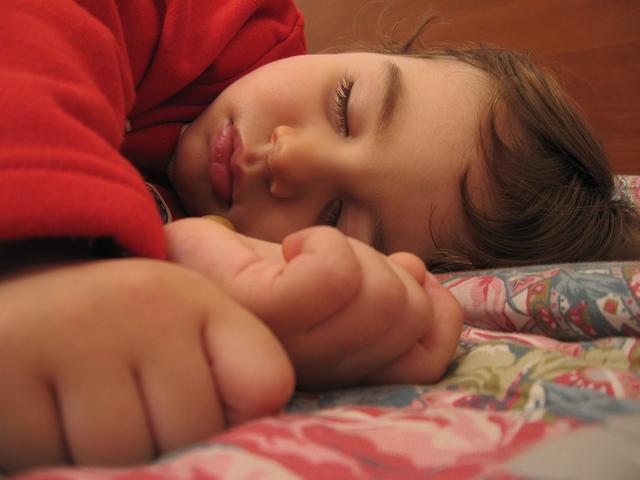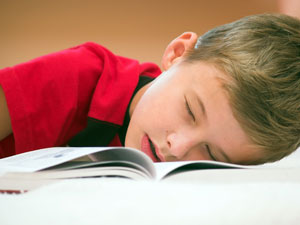어린이들의 뇌(children‘s brains)는 21세 때까지 계속 발전이 진행되는 것(a work in progress until the age of 21)이고, 그 상당 부분은 잠든 사이에 이뤄지기(be done while asleep) 때문에 수면 부족은 어린들에게 심각한 영향을 미친다(have a critical impact on children)는 연구 결과가 나왔다.
이스라엘 텔아비브대학의 베이비 사데 교수 연구팀에 따르면 어린이들의 수면 부족은 학업성적과 감정적 안정 뿐 아니라(not just to academic performance and emotional stability) 비만과 주의력 결핍 장애와 같은 연관이 없어보이는 현상들에도 영향을 주는(but to seemingly unrelated phenomena, such as the obesity and the attention deficit disorder)) 것으로 나타났다.

일부 전문가들은 성격 형성 과정의 수면 문제(sleep problems during formative years)가 뇌 구조에 영구적인 변화를 야기할 수도(can cause permanent changes in brain structure) 있다고 말한다. 심지어 심한 기분 변화, 우울증, 폭음 등 10대의 전형적인 특징들 중 많은 것들(many of the hallmark characteristics of being a teenager-moodiness, depression and binge drinking)도 고질적인 수면 부족에 따른 증상일(be symptoms of chronic sleep deprivation) 수 있다고 한다.
조사 결과에 따르면, 초등학교 나이부터 중학교 나이까지 현대 어린이들(modern children from primary school age right up to secondary)은 30년 전에 비해 평균 매일 밤 1시간 적게 자는(get an average an hour less sleep each night than they did 30 years ago) 것으로 나타났다. 13세 이전 어린이들의 절반(half of all pre-teens)은 평일밤에 7시간 미만 수면을 취하고(get less than seven hours’ sleep on weekday nights) 있고, 중학교에 가서는(when they reach secondary school) 6시간 남짓 자는(get only slightly more than six hours)것으로 집계됐다.
이 같은 현상은 과도한 활동 스케줄, 부담스러운 과제, 느슨한 취침시간, 침실에서의 TV와 휴대폰 사용 등 일반적인 21세기의 재앙들(the common 21st-century afflictions such as over-scheduling of activities, burdensome homework, lax bedtimes and TVs and mobile phones in the bedroom)에서 기인하는 것으로 분석된다.
부모들의 잘못(parental guilt)도 있다. 늦은 귀가(coming home from work late), 아이들과의 부족한 시간(wanting time with the children), 취침을 종용하는 독재자 역할에 대한 주저함(being reluctant to play the tyrant by ordering them to bed) 등이 그 것이다.

지금까지는 어린이들 수면 부족의 정확한 대가를 알지 못해(do not know its true cost to children) 그 잃어버린 시간을 무시할(ignore the lost hour) 수 있었다. 하지만 새로 개발된 기술적·통계적 수단들을 이용해(using newly developed technological and statistical tools) 그 영향을 분리·측량할 수 있게(be able to isolate and measure its impact) 됐다.
사데 교수 연구팀은 초등학교 3학년과 5학년 학생 77명에게 3일 동안 일찍 취침하거나 늦게까지 자지 말라는 지침을 줘서 귀가시켰다(send 77 third and fifth year pupils with instructions to go to bed earlier or stay up later for three nights). 각각의 학생에겐 그가 얼마나 오래 자는지 연구팀이 알 수 있게 해주는(allow the research team to see how much sleep they get) 손목시계 같은 장치(a wristwatch-like device), 액티그래프가 주어졌다(be given an actigraph).
한쪽 그룹은 하룻밤에 30분을 더 자고(get 30 minutes more sleep a night), 다른 한쪽 그룹은 31분을 덜 자는 기록이 나오도록 했다. 그리고 셋째 날 밤이 지난 뒤(after the third night) 연구팀은 어린이들에게 컴퓨터화된 IQ 테스트를 실시(test the computerized version of an IQ test)했다.
그 결과 잠을 덜 잔 5학년생은 3학년생 같은 성적을 냈다(perform in class like a third-former). 단 1시간의 수면 손실(the loss of just one hour‘s sleep)이 인지 발달과 성숙에 있어 2년 손실에 상당하는(be equivalent to the loss of two years of cognitive development and maturation) 것으로 나타난 것이다.
이같은 사데 교수 연구팀의 결과는 적은 수면량 차이가 학업 성과의 증거가 된다는(point to the academic consequences of small sleep difference) 다른 전문가들의 연구 결과와도 일치하는(be consistent with other researchers’ works) 것이다.

자기공명영상장치(MRI) 스캔 덕분에(with the benefit of MRI scans) 연구팀들은 수면 손실이 정확히 어떻게 어린이 뇌를 손상시키는지 이해하기 시작(start to understand exactly how sleep loss impairs a child‘s brain)했다.
한 예로 수면이 부족한 어린이의 뇌 세포들(brain cells)은 유연성을 잃어버려(lose their plasticity) 기억을 코드화하는 데 필요한 새로운 연계 형성을 할 수 없게 됨에(become incapable of forming new connections necessary to encode a memory) 따라 무엇을 배웠는지 잘 기억하지 못하게 된다.
수업 시간 중 부주의하게 만들기도(cause children to be inattentive in class) 한다. 수면 부족은 혈류에서 포도당을 뽑아내는 신체 능력을 약화시킨다(debilitate the body’s ability to extract glucose from the bloodstream). 그러면 어떤 목적을 달성하기 위해 생각을 조화시키고 행동 결과를 인지하는(orchestrate your thoughts to fulfil a goal and perceive the consequences of your actions), 이른바 ‘실행 기능’을 담당하는(be responsible for what‘s known as Executive Function) 전두엽 피질(prefrontal cortex)에 손상을 주게 된다.
수면 전문가인 매튜 워커 박사는 “뇌는 수면 중에 그날 배운 것을 뇌의 보다 효율적인 저장지대로 옮기게(shift what it learned that day to more efficient storage regions of the brain) 된다”면서 “수면의 각 단계(each stage of sleep)가 기억 획득에 고유의 역할을 한다(play its own unique role in capturing memories)”고 말한다.
예를 들어 외국어 공부(studying a foreign language)는 어휘 학습, 새로운 음 기억하기, 새 단어 발음 운동기능을 필요로 한다(require learning vocabulary, remembering new sounds and motor skills to enunciate the new word). 어휘는 서파(徐波) 수면, 즉 꿈을 꾸지 않는 숙면 도중 뇌에 의해 저장처리(be processed by the brain during slow-wave sleep, a deep slimber without dreams)된다. 이에 비해 기억은 REM 수면(뇌파에 각성파(覺醒波)가 나타나는 수면 상태), 즉 꿈을 꾸는 수면 중에 저장 처리된다(get processed during REM, or dreaming sleep).
어린이들의 수면은 그 질에 있어서 성인들과 차이가 난다(be different in terms of its quality from adult sleep). 어린이들은 수면의 40% 이상을 서파 수면 단계로 보낸다(spend more than 40 per cent of their sleep in slowwave stage).
수면과 기억의 상관 관계도 놀랍다. 부정적인 기억들(negative memories)은 두뇌의 편도체라는 부분에 의해 저장 처리된다(be processed by one area of the brain, amygdala). 이에 비해 긍정적이거나 중립적인 기억들(positive or newtral memories)은 뇌의 다른 부위인 해마상(海馬狀) 융기에 의해 처리(get processed by another, the hippocampus)된다.
수면 부족(sleep deprivation)은 편도체보다 해마상 융기에 더 손상을 준다(hit the hippocampus harder than the amygdala). 결과적으로 잠이 부족하면 즐거운 기억은 되살리지 못하고(fail to recall pleasant memories), 우울한 기억들만 아주 잘 상기하게(remember gloomy memories very well) 된다는 것이다.
수면은 비만에도 숨겨진 역할을 한다(play a hidden role in the obesity).
지난 30년간(in the past three decades) 어린이 비만(children obesity)은 3배로 늘어났다(has tripled). 이와 관련, 사람들은 TV라는 한가지 원인에만 집중해왔다(have focused on one culprit – television). 그러나 텍사스대학교 엘리자베스 밴더워터 교수에 따르면 요즘의 비만 어린이들(obese children)은 마른 어린이들보다 TV를 더 보지 않는(watch no more TV than thin children) 것으로 조사됐다.
실제로 비만은 1970년대 이후 기하급수적으로 증가해왔지만(have increased exponentially since the Seventies), 어린이들은 하루에 단지 7분 더 TV를 더 보는(watch only seven more minutes of TV a day) 것으로 집계됐다. TV 외에 다른 무엇(something other than television)이 어린이들을 더 비만하게 만들고 있다는(be making children fatter) 얘기다.
수면시 무호흡과 당뇨병 간의 연관성을 이미 알고 있었던(be already of an association between sleep apnea and diabetes) 수면 연구학자 이브 밴 코터 박사는 5년 전 수면을 비만과 연관짓는(link sleep to obesity) 신경 내분비 연쇄반응을 발견(discover a neuroendocrine cascade)했다.
수면 부족(sleep loss)은 식욕을 억누르는 렙틴을 감소시키고(reduce leptin which suppresses appetite), 배고픔을 알려주는(signal hunger) 그렐린 호르몬을 증가(increase the hormone ghrelin)시킨다. 또 몸이 뚱뚱해지도록 자극하는(stimulate your body to make fat) 스트레스 호르몬 코티솔은 상승시키고 성장호르몬은 교란(disrupt human growth hormone)시킨다.
또 다른 부수적 요인도 있다. 침대에서 소모되는(be burned in bed) 칼로리는 적지만, 최소한 자는 동안 먹지는 않는다(do not eat anything during sleep). 잠을 잘 못 잔 어린이는 너무 피곤해져 운동을 하지 못한다(get too tired to exercise). 결국 밤잠을 잘 자고 난 후의 칼로리 소모(the calorie burn after a good night’s rest)가 더 높다는 것이다.
잠을 덜 자는 어린이들(children who sleep less)이 잠을 더 자는 어린이들보다 더 뚱뚱해질(get fatter than those who sleep more) 수 밖에 없다.